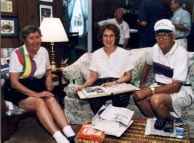Early in 1992, David VandeLinde, at the time dean of the Whiting School of Engineering, commissioned a task force to evaluate the alumni relations program of the School, which had been founded 13 years earlier. Chaired by A. Paul Cox Jr. ’59, ’70 MS, the task force emphatically concluded that the School should establish a national engineering alumni group. It would bring together engineering alumni across the range of geographic regions, class years, majors, and degrees awarded.
By the next fall, that plan had been rolled out. On October 10, 1992, the Society of Engineering Alumni (SEA) Council, made up of 30 Hopkins engineering alumni from across the country, held its first meeting. The mission of this newly formed alumni association was “to encourage and represent alumni interests, foster relationships, and utilize the resources of its members to promote the continued success of the Whiting School of Engineering and the Johns Hopkins University.”
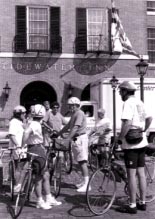
Now 10 years later, more than 200 alumni volunteers have taken active roles to further the SEA’s mission and gratefully to give back to their alma mater.
Joe Reynolds ’69, the SEA’s inaugural chair, remembers taking on one of the first tasks of any successful alumni organization: locating the alumni. Reynolds and his team began to raise the awareness of the SEA on campus and across the country. In addition to the SEA Council’s members (who are elected to three-year terms), there are six regional committees, plus four standing committees that address specific alumni interests: Communications, Industrial Relations (originally called Faculty Relations), Nominations, and Student Relations.
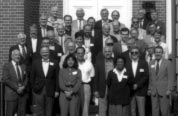
The SEA’s accomplishments over the last decade can be attributed in large part to the enthusiasm and dedication of these committee members. Many of these alumni express how rewarding it has been to have actually made an impact at the School, where they say their volunteering is taken very seriously.
These alumni are also extremely committed to helping students in any way they can. To guide future engineers as they prepare to enter a more competitive job market, the SEA hosts “Career Night” every fall on the Homewood campus. Members assist students in networking and preparing for their eventual job searches. “Career Night” brings together current students and a panel of recent engineering graduates employed in technical fields. The panelists discuss how their education and experiences at the Whiting School prepared them to meet the challenges of the working world. They recall what it was like to look for a job, and offer advice to the soon-to-be engineers.
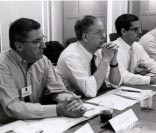
One student serves on the SEA Council, and another on the Student Relations Committee. Over the years, SEA members have identified summer internships for Whiting School students, and creating those workplace opportunities remains a goal today.
Another important SEA priority has been to develop programs and activities that assist and encourage interaction between faculty and alumni. The Industrial Relations Committee sets its sights on promoting research collaborations between faculty and the private sector. Alumni themselves can directly engage the consulting services of faculty experts. The SEA recognizes the direct relationship between a successful faculty and successful engineering students. Faculty, staff, and student groups enjoy inviting alumni who are accomplished in their fields to return to campus as guest speakers at seminars or symposia.
The “Corporate Connections” program, which the SEA initiated and sponsored, developed partnerships between the Whiting School—its faculty, students, and administrators—and corporations and industry. The series of programs encouraged executives to come to the Homewood campus to learn about research activities that were of interest to the private sector, as well as to find out how they could become more involved with the Whiting School.
Today, at dinners and poolside parties, during tours of hydroelectric plants or other facilities, alumni find that one major benefit of being part of the SEA is the chance to reconnect with old friends and make new acquaintances within the Hopkins engineering community.
Dick Nozemack ’67, a former SEA chair and vice chair, acknowledges, “I have made more Hopkins friends in the last 10 years than I did while I was in school!”
Reynolds likewise believes that Hopkins engineering graduates find great value in meeting other alumni. SEA’s members seem to agree that being involved creates a strong, direct link to their school and provides a very positive extension of their Hopkins experience.
When asked what he appreciates most about participating in the Society of Engineering Alumni, Tony Dahbura ’81, ’82 MSE, ’84 PhD, a past chair, replied, “the prestigious Hopkins name allows the SEA to give alumni exclusive access to unique people, places, and events that would not otherwise be available.” For example, SEA’s Northeast Regional Committee organized a behindthe- scenes look at “The Big Dig,” Boston’s 20-year highway project intended to alleviate some of its infamous Central Artery/tunnel traffic nightmares.
Other regional committees have also enjoyed the camaraderie of fellow alumni and their families while taking part in the organization’s activities. In Georgia, this summer marked the 8th Annual Maryland Crab Feast. Now expanded into a University alumni event, it is co-sponsored by the Johns Hopkins Alumni Association and the SEA’s Southern Regional Committee. Joe Strohecker ’53, a native Baltimorean who serves as the SEA’s regional liaison, originated this popular crab feast in Atlanta, where he now lives. He works hard to plan regional events to keep the Hopkins engineering community connected in the South. “I like being re-associated with Hopkins, my classmates and others,” says Strohecker. “The SEA is my primary avocation.”
SEA’s Maryland Regional Committee also has held numerous events, such as informal dinners in the Johns Hopkins Club, insider’s tours of the Johns Hopkins Applied Physics Laboratory, retreats to the Eastern Shore, and an Aberdeen IronBirds baseball game in the new Ripken Stadium.
Because SEA members have such a close involvement with the Whiting School and the University, they gain an understanding of the School’s needs and how tuition alone is not enough to secure the same Hopkins education for future generations. They seek to set an example for other alumni and to encourage them to actively support the goals of their school.
In June, as Ilene Busch-Vishniac looked back on the SEA’s first 10 years, she shared her praise of the alumni organization: “After five years as dean of the Whiting School, I can honestly say that the SEA is crucial to everything we do. We would not be the school we are today without them. They have given back so much to their school—their generous contributions of time, experience, enthusiasm, and financial support have enhanced the engineering education offered at the Whiting School, for past students and for generations of students to come. I salute them for an impressive first decade and encourage them to continue in the same spirit of dedicated volunteerism for the future.”
Current chair John C. “Jack” Rodowski ’53 noted, “I am honored to be part of the SEA and am equally excited to march into the future. I am confident that we will be able to grow to fit the needs of the Whiting School, our alumni, faculty, and students.”
Be a Part of 10 More Successful Years!
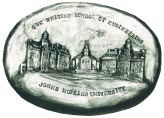
Did you know that as a Hopkins engineering graduate you are already part of the Society of Engineering Alumni (SEA)? Membership starts the day you graduate.
The SEA offers numerous alumni volunteer opportunities. If you are interested in becoming more involved, please e-mail us at [email protected] and tell us where your talents might best fit (see list at right). Please include your name, graduation years/degrees, address, employer/ job title, preferred e-mail address, and daytime phone number. Or call (410) 516-8723.
Indicate your area(s) of interest in SEA activities:
- Student relations
- Industrial relations
- Nominations
- Communications
- Planning a social event in your area
- Assisting the Admissions Office with recruiting students in your area
- Enrolling your company in SEA’s Summer Internship Experience for students
- Volunteering to network with recent Whiting School graduates.
